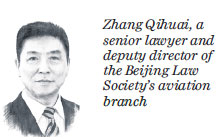Flying car is a good idea but it will be hard to realize

Editor's Note: Zhejiang Geely Holding Group Co's plan to purchase Terrafugia, a US-based startup company that made the world's first flying car, was recently approved by US government departments. Will flying cars help ease traffic jams in China? Two experts share their views on the issue with China Daily's Zhang Zhouxiang: Excerpts follow:

Not likely to be a hit with consumers
The idea of a flying car seems creative. Combining the advantages of a planes and a car, a flying car requires a much smaller parking space than a plane and is more convenient than a car, especially when it comes to maneuvering traffic jams.
In general, two types of flying car have been developed. The first is a fixed-wing car, with the most typical model being the Transition from Terrafugia, which Geely is purchasing. It is more like a small plane with collapsible wings that can fly to avoid traffic jams and travel on the road when approaching its destination. It has quite a long flying range, between 500 and 600 kilometers.
The other is a rotor-wing flying car, something like a small helicopter. It has two rotors, one on the top and the other at the back, that enable it to fly. The wings can be folded on landing and the vehicle can be driven on the road. One such model is Liberty Sport, made by PAL-V in the Netherlands. Compared with Transition, it needs a narrower lane and smaller stretch of road for takeoff and landing, but its flying range is only about 200 km.
The technologies used to design and manufacture flying cars have matured, and their safety can be guaranteed. The problem is that there is no universal technological standard for flying cars. In the United States, one of the few countries where they are legal, flying cars are defined as "small, light airplanes", so they need to meet the technological standards of both cars and airplanes.
But since the motors and structures of cars and airplanes are based and built on different principles, and aerodynamic designing is expensive, the cost of flying cars will be very high. So there is little possibility of flying cars becoming popular among consumers.

Lots of work needed to introduce machines
In 2015, the US Federal Aviation Administration approved Transition, the world's first flying car, as a "small, light airplane" that legally can be driven as well as flown. This is possible in the US because its laws exercise little control over airspace below 3,000 meters.
But in China, low-altitude airspace governance is still undergoing reform and there is no specific regulation on flying cars. So a lot of legislative work is needed before flying cars can be legally operated.
Many questions need to be answered before flying cars can be introduced in China. What kind of driving and flying licenses should the drivers hold? What sort of training will they need? Which department should be in charge of them? What kinds of roads can be used for flying cars to take off and land on? Should special roads be built or can some of the existing ones be reconstructed for the purpose?
Also, devices to monitor "road" safety and flight routes of flying cars have to be installed before such machines are introduced.
More important, Chinese laws forbid car owners from modifying their vehicles without official permission. Since flying cars are different from ordinary cars in design, speed and the nature of their engines and accessories, it will be a big challenge for lawmakers to include them in the legal standards for vehicles.
To summarize, a lot of work needs to be done before flying cars can really fly in China.

(China Daily European Weekly 09/01/2017 page11)
Today's Top News
- Macao SAR holds flag-raising, reception to mark 26th anniversary of return to motherland
- China issues rules to regulate pricing practices of internet platforms
- US hits over 70 IS-linked targets in Syria in massive retaliatory strikes
- Technological innovation brings cultural heritage alive
- Consumption to play bigger part in growth
- Opposition moves to impeach Lai






























